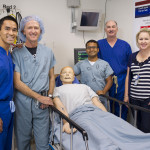Anesthesiology is a specialty of medicine.
Anesthesiologists are physicians who promote patient well-being in and out of the operating room. As a diverse group, we can deliver safe anesthesia care in the operating room and procedural areas using a wide array of state-of-the-art technology, provide medical evaluation and consultation for patients before and after surgery, manage pain conditions resulting from surgery or other injuries in the short- and long-term, and discover safer and more effective ways to care for patients in the field of anesthesiology research.
After college, modern anesthesiologists complete four years of medical school then four years of residency training, and many go on to pursue extra years of fellowship training in pediatric or cardiac anesthesiology, acute or chronic pain medicine, critical care medicine, research, or other specialty fields of perioperative care. Anesthesiologists are specialists in the human condition under stress, mastering the areas of physiology and pharmacology, including the body’s response to potent medications.
 Great strides in patient safety have been made by anesthesiologists. Specifically, the use of life-like patient simulation in the training of new physicians was pioneered by anesthesiologists. Research conducted by anesthesiologists at the VA Palo Alto, in part, led to the replacement of toxic (and occasionally explosive) anesthetic gases with the safe agents we use today. It is no exaggeration to say that modern surgery would not exist without the incredible advances in anesthesiology.
Great strides in patient safety have been made by anesthesiologists. Specifically, the use of life-like patient simulation in the training of new physicians was pioneered by anesthesiologists. Research conducted by anesthesiologists at the VA Palo Alto, in part, led to the replacement of toxic (and occasionally explosive) anesthetic gases with the safe agents we use today. It is no exaggeration to say that modern surgery would not exist without the incredible advances in anesthesiology.
I am proud to be an anesthesiologist and follow in the footsteps of giants who have come before me. I have the best job in the world: helping patients through the stressful experience of surgery, relieving pain, and making new discoveries through research that will hopefully benefit future patients.